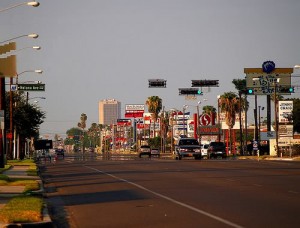Border Startups Have a Rough Time Raising Capital

![]() By Cincdy Casares, Texas Observer
By Cincdy Casares, Texas Observer
Earlier this year, when San Antonio Mayor Julian Castro gave the keynote address at the Democratic National Convention, many Hispanic Texans felt they had finally arrived. When Latinos overwhelmingly helped re-elect President Obama in November, Tejanos continued to celebrate this apparent rise to power. But Hispanic Texans will never take their rightful place at the table until they succeed economically. Nowhere is this tension between rising political power and lagging economic status more apparent than the Texas border. Sixteen of the 100 poorest counties in America are found along or near the Texas-Mexico border. This isn’t surprising when you consider that Hispanic Texans generally receive inferior educations and experience higher unemployment than their Anglo counterparts. So, what’s to be done?
 Some border-based entrepreneurs are trying to address these inequities by giving Latinos access to the rarefied world of venture capital.
Some border-based entrepreneurs are trying to address these inequities by giving Latinos access to the rarefied world of venture capital.
Rodolfo Sanchez lives in the Rio Grande Valley, and earlier this year, his company, Plasma2Energy, got a contract from the city of McAllen to build a waste-to-energy plant—a cutting-edge, green-energy technology. Developed by Monterrey, Mexico-based ABA Research, the 27-megawatt plant converts municipal trash into electricity, 25 percent of which would be used by the city.
“This technology offers savings in the long term for the city, which is very attractive,” Sanchez says. “It’s also very clean, and that is very attractive too.”
Sanchez offered to deploy the first commercial-sized facility in the U.S. for ABA Research. He just needed the capital, about $15 million for the first phase.
But raising the money took longer than Sanchez’s Monterrey investor was expecting. ABA got nervous and pulled out, leaving Sanchez to bootstrap Plasma2Energy while he searched for funds—funds he still hasn’t acquired. Ultimately, ABA decided to build a plant in Mexico instead. He hopes that Plasma2Energy will build a plant in McAllen in the future, though that’s uncertain.
Sanchez says the McAllen Economic Development Corporation didn’t understand the technology enough to offer more than standard city incentives—a blow that not only cost him much-needed money, but deprived his company of an endorsement that could have generated interest from venture capitalists.
Sanchez’s experience is all too common for Hispanic entrepreneurs. A 2011 Venture Capital Census of nearly 600 venture capitalists found that 87 percent of all respondents identified as white, with fewer than 2 percent identifying as Latino. Eighty-nine percent were men.
This nearly all-white, all-male demographic adversely affects high-tech entrepreneurs who don’t fit the “white guy” tech mold.
“Most people rely on their relationships with wealthy people to get venture capital,” says Teo Tijerina, co-founder and executive director of Austin-based EDCO Ventures, a nonprofit focused on economic development in poorer areas of Texas, including the border region. EDCO has a goal of raising $50 million to $100 million in venture capital for business investment in Texas. So far it’s amassed $3.5 million from the federal government, private investors and national banks.
“If you can do a semiconductor plant in Taiwan with far less infrastructure, you can do one in the Valley,” says Tijerina, who was raised in McAllen, as was the company’s co-founder Leo Ramirez. “The border region just needs the know-how and the access to capital and technology.
Of course, there’s a whole historical basis for why they don’t have it.”
The state of Texas runs an Emerging Technology Fund to help promising start-ups. Recipients must show that they can also raise capital locally. That can be a challenge for entrepreneurs along the border. Few subsidies from the Tech Fund flow south.
“Perhaps regions like Austin, Dallas and Houston don’t need state funding, but the border, East Texas, and other parts of the state do,” Tijerina says.
Tijerina also says that Texas’ leading research universities don’t do enough to aid poor communities. At a meeting with the University of Texas at Austin’s Office of Technology Commercialization, Tijerina says, an official told him the office prefers to work with entrepreneurs who headquarter in Austin.
“It would make sense that the office show a preference toward entrepreneurs in Texas versus an entrepreneur in Michigan, but it shouldn’t matter whether it’s Austin or San Antonio or Brownsville,” Tijerina said.
This article was first published in The Texas Observer.
Cindy Casares is a columnist for the Texas Observer. She is also the founding Editor of Guanabee Media, an English-language, pop culture blog network about Latinos established in 2007. She has a Master’s in Mass Communications from Virginia Commonwealth University Brandcenter. Prior to her career in journalism, she spent ten years in New York City as an advertising copywriter. During her undergraduate career at the University of Texas she served under Governor Ann Richards as a Senate Messenger during the 72nd Texas Legislature.
[Photo by city-data.com]
